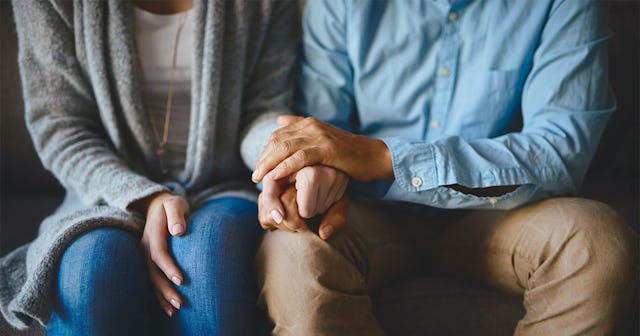Forgiveness Is Good For You, But It Definitely Isn't Easy

Everyone talks about forgiveness, even Oprah. There are countless self-help books written about the subject, podcasts touting its importance, and lists dedicated to outlining its health benefits. Brené Brown discusses its importance in her book, Rising Strong. The words “I forgive you” are powerful — for both those hearing them and those saying them.
For me, what’s tough is journeying toward the ability to utter those words. I forgive you. It is a process towards finding peace with pain or suffering no matter how distant (from childhood) or recent (maybe a work conflict or marital indiscretion). It is a process for us all, no matter where we are on the forgiveness train. And it involves a hell of a lot of mental and emotional hard work to get to a place to say those three small words in a meaningful and honest way.
For me, it’s taken years to be able to say these words to the people who’ve hurt me the most — my parents. In fact, I’ve never even told them to their faces that I forgive them for abandoning me as a child. I’ve written it down and journaled about it. I’ve said it after a really good meditation session, out loud, in the privacy of my own home. I’ve professed my need to forgive while speaking to my wife about some event from childhood which caused me pain. But I’ve never truly done it — released myself from the pain my parents caused me.
Forgiveness isn’t about forgetting or holding onto anger; it’s very much the opposite. It’s about seeing the truth, seeing the facts for what they are, and making peace with that pain, whether it is emotional or physical. I am getting there, but it’s a process that takes time — not just a quick decision to be made.
Imi Lo writes in Psychology Today, “By covering up our anger, prematurely moving into fake forgiveness, drowning our truths to protect others, letting go of our boundaries for surface harmony, we are bypassing an essential step in our attainment of emotional freedom.” This is how I “forgave” my mother, or thought I did — wallowing in falsehood, uttering the words without meaning them, not feeling the forgiveness deep in my soul, not truly releasing the pain she caused me. It wasn’t until her death in 2007 that I actually forgave her. I had no room to be angry anymore, and physically she was gone — unavailable to cause me any more pain. It wouldn’t be until years after her death that I released the pain and suffering and truly felt free.
As it turns out, emotional benefits aren’t the only kind we can reap from forgiveness. According to the Mayo Clinic, forgiving and not holding grudges enables us to receive a host of health benefits too. When you dole out forgiveness, you can receive boosts to your mental health, fewer bouts of anxiety, a decrease in blood pressure, and even a stronger immune system.
There are both emotional and mental strings attached to the practice of forgiveness. The older I get, the more I understand how important forgiveness is, and also how complicated it is to actually say the words. As my kids get older and the need to forgive others becomes a lesson they too must learn, it’s a little tricky as their parent to teach them a lesson in the deep soul work that I am still learning to master myself. I do not carry grudges, but I do have a hard time forgetting the hurt someone caused me — the deep-rooted pain of it all.
Certified Radical Forgiveness Coach Ana Holub says: “The expanded version of forgiveness that I love to teach is a deep soul-level letting go of our pain or sorrow or suffering, and we do that because we want to be free. We do that because we want to be healthy, and we want to have peace of mind.”
Genuine forgiveness isn’t about forgetting, and it’s not about giving the person who caused you harm, pain, suffering, or distress a pass on their behavior. It is about actively making the choice to free yourself from carrying the burden of living in the mess of another’s poor choices. And we owe that to ourselves, even if we don’t owe it to them.
This article was originally published on